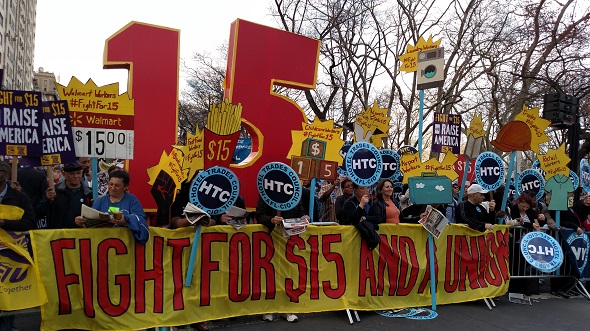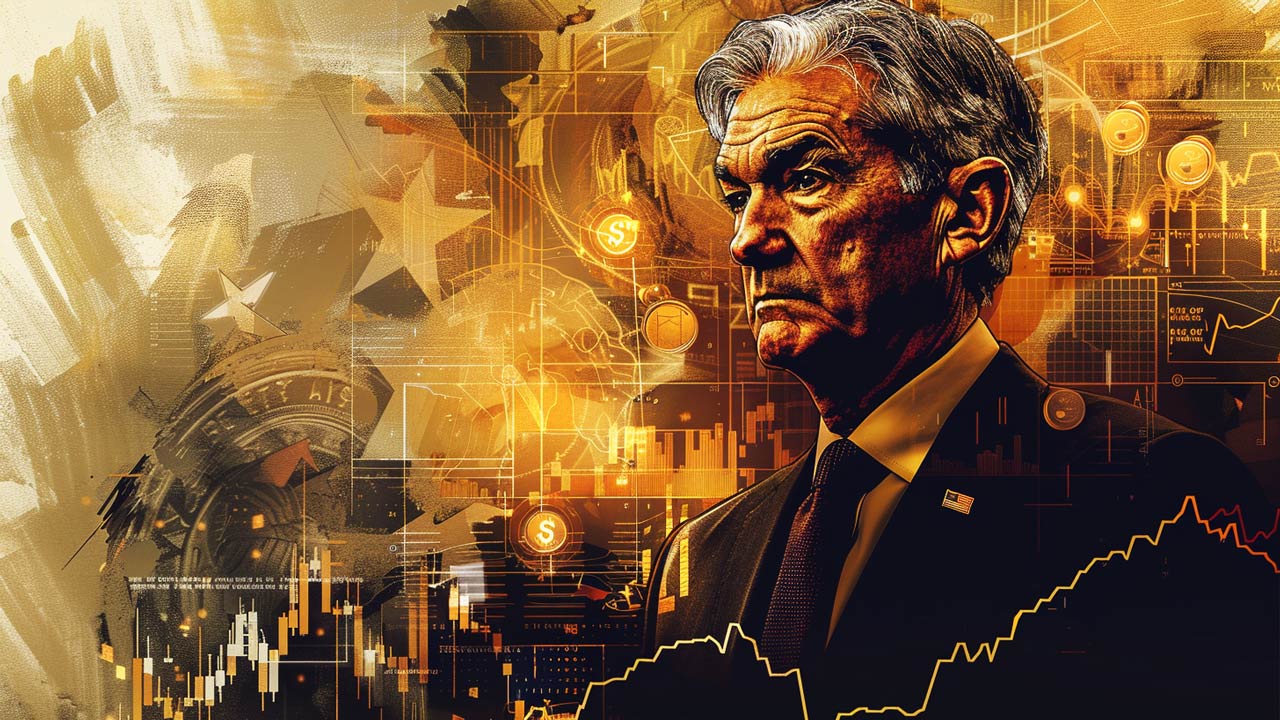The Fight for $15: Good Politics, Bad Economics
Raising the minimum wage might be good politics, but it’s bad economics – despite what some economists say.
Last week, the Maryland legislature overrode the governor’s veto and adopted a $15 per hour minimum wage. It was a major victory for the “Fight for $15” crowd, but it almost certainly won’t be for low-skilled workers — at least not the ones who whose maximum wage will be $0 per hour because they cannot find jobs.
The minimum wage debate takes place within a swirl of emotion that tends to blind us to basic facts. Wages are nothing but prices. And when the price for something goes up, demand for that thing drops. This is one of the most fundamental laws of economics. But for some reason, huge swaths of the population think this economic law ceases to operate just because you apply it to labor.
It doesn’t.
From this simple economic truth, we can safely say that employment levels for low-skilled workers will be lower with a higher minimum wage than it otherwise would have been.
As recently as the 1980s, this was almost universally accepted by economists — even those on the left. But things changed in 1994 with the release of the Card-Krueger study that purported to show raising the minimum wage did not have a substantial impact on employment. Economist Robert Murphy explained what happened in a 2014 article.
Once the researchers controlled for other trends, it appeared that in practice, modest increases in the minimum wage had a negligible impact on employment in the low-skilled and teen populations. Indeed, this revisionist literature has grown so influential that, recently, 75 economists—including seven Nobel laureates—publicly signed a letter to prominent federal politicians, urging them to raise the federal minimum wage to $10.10 by 2016.”
So, what gives?
This is a prime, real-world example of a truth economist Frank Shostak explained in a recent article: without a firm grasp of basic economic principles, it becomes impossible to properly evaluate any observations you make and to properly interpret economic data.
Murphy and Tom Woods discussed these minimum wage studies during episode 182 of the Contra Krugman podcast. A Murphy pointed out, there has been a raging debate over these studies in the economic literature for years. Using different assumptions and variables in their equations, researchers can “prove” completely opposite conclusions using the exact same data-set. As Murphy put it, you can manipulate the math to “prove” just about anything.
This reveals an underlying problem with economic data-driven research. You can’t put the economy in a laboratory and isolate a single factor. There are hundreds of variables impacting employment in an economy at any given time. It’s virtually impossible to isolate the minimum wage and definitively say, “X caused Y.” Murphy summed it up this way during the podcast.
This stuff is tricky and a lot of times when you get into the weeds of it’s just ‘Aw, well they have their specifications and we find these statistically significant results,’ and these guys tweak it and you end up with something else. The data is messy and it’s noisy. That’s the problem with this stuff too. There are a lot of things going on besides just hiking the minimum wage that changes employment, and so, if you want to, you can keep changing your specifications until you get the result you want. You haven’t lied. You did the regression correctly given the data and the specification you looked at.”
Again – you have to have solid economic theory. And the logic of supply and demand is irrefutable. If you raise the price of labor, there will be less labor used. If a person produces $10 per hour of output, you aren’t going to pay him $15 per hour.
Opponents of the minimum wage are often caricatured as unconcerned with the plight of poor, low-skilled workers. And yet it’s the policies pushed by “Fight for $15” crowd that actually hurts the employment prospects of many of these workers. Of course, the workers who manage to keep their jobs will benefit from the higher pay. But lost in the analysis are those workers who lose their jobs or never get hired to begin with. They make nothing. And sadly, the remain virtually invisible in the political calculations.
Economist Frederic Bastiat implores us to look not only at the seen but also the unseen. This is the mark of a good economist. But politics only pays attention to what is seen. What is unseen can be swept under the rug for political expediency.
Minimum wage advocates seek to solve a legitimate problem facing American workers: their dollars buy less and less every year. But simply mandating employers fork over more dollars is a little like putting a band-aid on an amputation. It doesn’t do anything to address the underlying problem. We don’t have a wage problem. We have a money problem.
Get Peter Schiff’s most important Gold headlines once per week – click here – for a free subscription to his exclusive weekly email updates.
Interested in learning how to buy gold and buy silver?
Call 1-888-GOLD-160 and speak with a Precious Metals Specialist today!





 Since Nayib Bukele became president of El Salvador, El Salvador has been in American media and global political discussion more than ever. While much of the attention focuses on Bukele’s mass incarceration of gang members and a decline in homicide of over 70%, Bukele has also drawn attention to his favoritism towards Bitcoin and how he […]
Since Nayib Bukele became president of El Salvador, El Salvador has been in American media and global political discussion more than ever. While much of the attention focuses on Bukele’s mass incarceration of gang members and a decline in homicide of over 70%, Bukele has also drawn attention to his favoritism towards Bitcoin and how he […] With gold hitting yet another awe-inspiring all-time high in the wake of Powell’s remarks reassuring markets (more or less) to expect rate cuts in 2024, a few analysts are pointing out risk factors for a correction — so is there really still room to run?
With gold hitting yet another awe-inspiring all-time high in the wake of Powell’s remarks reassuring markets (more or less) to expect rate cuts in 2024, a few analysts are pointing out risk factors for a correction — so is there really still room to run? Gold hit a new all-time nominal high, surpassing the previous record set in December of the previous year. The precious metal’s price reached approximately $2,140, indicating a robust and continuing interest in gold as a safe-haven asset, despite a rather peculiar lack of fanfare from the media and retail investors. This latest peak in gold […]
Gold hit a new all-time nominal high, surpassing the previous record set in December of the previous year. The precious metal’s price reached approximately $2,140, indicating a robust and continuing interest in gold as a safe-haven asset, despite a rather peculiar lack of fanfare from the media and retail investors. This latest peak in gold […] The gold price has been surging, with unprecedented central bank demand gobbling up supply. It has been a force to behold — especially as US monetary policy has been relatively tight since 2022, and 10-year Treasury yields have rocketed up, which generally puts firm downward pressure on gold against USD.
The gold price has been surging, with unprecedented central bank demand gobbling up supply. It has been a force to behold — especially as US monetary policy has been relatively tight since 2022, and 10-year Treasury yields have rocketed up, which generally puts firm downward pressure on gold against USD.  Total gold demand hit an all-time high in 2023, according to a recent report released by the World Gold Council. Last week, the World Gold Council (WGC) released its Gold Demand Trends report, which tracks developments in the demand for and use of gold around the world. Excluding over-the-counter (OTC) trade, 2023 gold demand fell slightly from 2022 […]
Total gold demand hit an all-time high in 2023, according to a recent report released by the World Gold Council. Last week, the World Gold Council (WGC) released its Gold Demand Trends report, which tracks developments in the demand for and use of gold around the world. Excluding over-the-counter (OTC) trade, 2023 gold demand fell slightly from 2022 […]